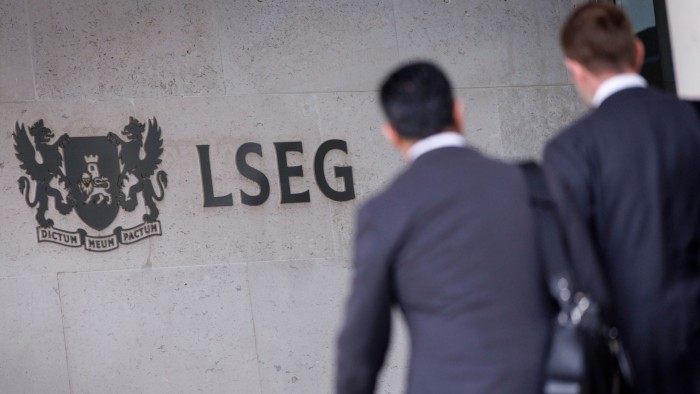Unlock the Editor’s Digest for free
Roula Khalaf, Editor of the FT, selects her favourite stories in this weekly newsletter.
Ever since Shakespeare had Juliet wonder whether names really mattered, the answer has tended to be that they do. Not far from where the playwright’s masterpiece was first staged sits London Stock Exchange Group, or LSEG as it prefers, whose ailing share price is in stark contrast to its peers. Could this bourse, given any other name, cause investors to sniff more appreciatively?
Of the world’s top 10 exchange groups by market value, LSEG is the only one this year whose shares have fallen, down 17 per cent despite being part of, and home to, the FTSE 100 which has climbed 13 per cent. Last week its stock hit a year-low despite reporting first-half revenue and earnings that beat estimates. Some weakness in subscriptions and a softer dollar took away a little of the gloss, but nothing that really merited the shares dropping 8 per cent.

Could part of LSEG’s problem be that its name has become a distraction rather than a descriptor? London’s travails as a financial centre are a well-known business trope and discussions on how to re-energise the City no doubt take up an outsized amount of LSEG boss David Schwimmer’s time, relative to their impact on his business.
Since Schwimmer transformed the group with the $27bn purchase of Refinitiv is 2021, LSEG’s biggest business has been data and analytics while its capital markets unit, home to the London Stock Exchange, is dominated by Tradeweb, the US-listed bond platform that it inherited control of as part of that deal. Last year the stock exchange was just 3 per cent of LSEG’s total revenues — more than two-thirds of which overall were generated overseas.
The result is a company focused on boosting the sort of sticky, subscription-based revenue usually prized by investors, while easing its exposure to market volatility. It is not dissimilar in strategy to US rival Nasdaq, which has lessened its exposure to market vagaries by investing in technology, such as its $11bn purchase of compliance software specialist Adenza in 2023.

LSEG’s shares now trade on 22 times estimated 2026 earnings, roughly in line with its European peers, but behind the 26 and 24 multiples commanded by Nasdaq and Intercontinental Exchange respectively. Its also behind London-listed, data-driven groups such as Experian and RELX, on 27 times apiece, to whom it could as easily be compared.
Stock exchanges are imbued with a sense of national pride similar to so-called flag carrier airlines. Schwimmer last week was at pains to point out the LSE was core to LSEG’s strategy. That’s fine. The 233-year-old New York Stock Exchange benefits from being part of the much bigger 25-year-old Intercontinental Exchange, and is no less prominent for that. There’s a lot in a name. LSEG’s doesn’t seem to be helping it much.
Letters in response to this column:
Demerging can re-energise London Stock Exchange / From Barry T Gamble, Banbury, Oxfordshire, UK
BA analogy is not one the stock exchange should use / From David Salisbury, Haddenham, Buckinghamshire, UK



